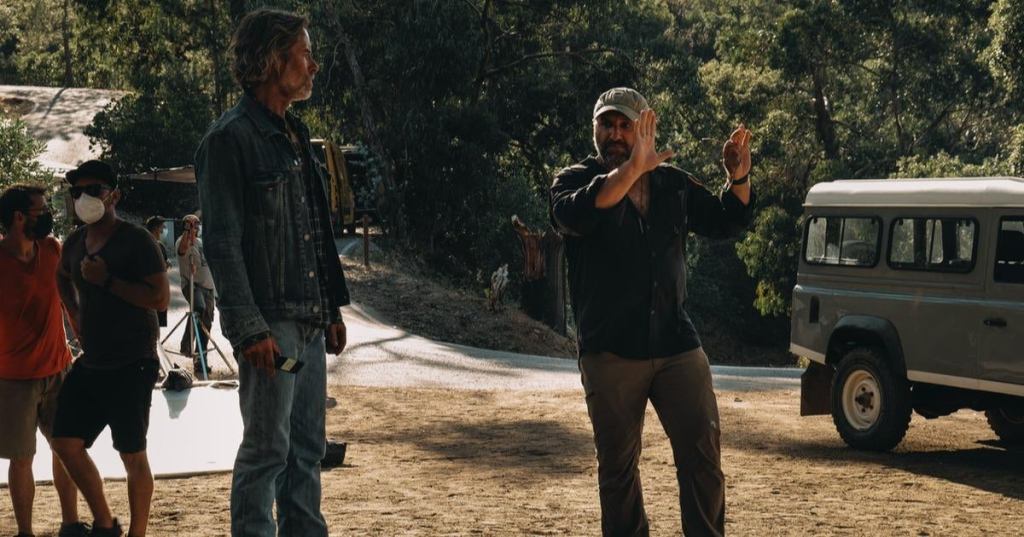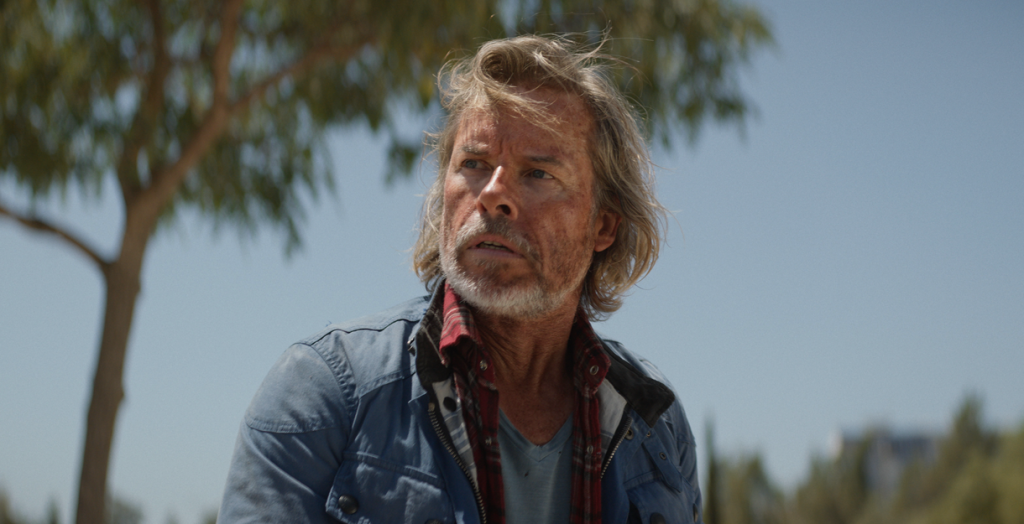The Infernal Machine, a new thriller out now from Paramount Pictures, is a labor of love from writer-director Andrew Hunt who has crafted a deeply compelling movie. Recently PopCulture.com had a chance to catch up with Hunt to discuss the film, including how he thinks of good thrillers as an “obstacle course.” He also joked about praising the “film gods” for bringing him Emmy-award-winning actor Guy Pearce as his film’s star, but more importantly, as a crucial collaborator.
In the film, Pearce plays Bruce Cogburn, a controversial author whose novel The Infernal Machine sparked a terrible tragedy. Now a recluse, Bruce begins receiving letters from an obsessed fan as he is attempting to write his second novel. Eventually, Bruce will be forced down a deadly path that brings his dark past into the light. The movie is not without its comparisons to Pearce’s incredible performance in Christopher Nolan’s Memento (2000), which Hunt said would not flatter him more. “I’m in that same group where I have felt like for the last 20 years, the one genre that has felt a little dusty has been the psychological thriller,” Hunt told us. “And I think the reason that is, is because of Memento, because of Fight Club, because of Se7en, and The Usual Suspects.”
Videos by PopCulture.com
He continued, “That there was these groundbreaking thrillers that really twisted the narrative for an audience. Almost like back in the 70s, the movie The Sting completely flipped the script. I feel that those movies and that… And oddly enough, a lot of them, [writer-director David] Fincher was involved with. But they flipped the script so much that I feel that the psychological thriller genre has been resting on those laurels for the last 20 years.”
Hunt went on to say, “So when people are watching psychological thrillers, nowadays, they’re almost predicting how it’s going to end. Because it’s either going to end the way that Fight Club did, or Memento did. Because those movies were so groundbreaking, but I feel the groundbreaking of that time. Now, if we tried to rehash that, it would feel like a carbon copy of something. So we really wanted to create a new psychological thriller, one that knew how smart the audience is, because the audience is always smarter than the filmmaker. And we wanted to set an obstacle course out and really let the audience play.”
The filmmaker added, “And I find with a film, the less you say, the more the audience participates in the story. The more they are leaning into the story. The more they’re trying to figure out the character and what’s the character really thinking. And when you do that, you’re engaged in the audience in such a way that they don’t feel like a spectator, they’re a participant of the story. They’re creating their own narrative before there’s a payoff. And it’s something that we really respect. And so my job as a director and the writer is to create a real event or an experience for an audience that they can go through this movie, think they know what’s going on, and then hopefully be pleasantly surprised that like, oh my God, this is an emotionally paid off movie. And I had no idea where it was going, and I stopped thinking about it and just enjoyed the ride, if that makes sense.”

Elaborating on his “obstacle course” analogy, Hunt said, “The thing that I love doing when I’m making films is, I love tapping into the audience’s imagination. And I feel that when you do that, there’s a bond between the film and the audience that is tighter than…” He then referenced a classic horror-thriller, saying, “Jaws, we didn’t see that shark for the first 50 minutes of that movie. And yet we all had our own idea of how terrifying that thing was in that first 50 minutes.”
Hunt continued, “So it’s one of those things where I really love dancing with the audience, and giving and making the film accessible enough to allow them to put their own thoughts, feelings, and opinions into it. And we did that throughout even the trailer, for the poster. It’s always just, ‘I just love them being involved.’ I don’t like them working, because I want them to sit back and I’ll do all the work, right? But I really want them to feel like they own the movie.”
The director added, “When you pull them in and they’re connecting in a certain way emotionally as it’s a puzzle piece… All the different elements you play with them with, I think it’s… I know for me, that’s the kind of movies that I love watching. It’s the kind of movies that I love watching more than once… I hope Infernal is like that, a repeat viewing for the audiences. They watch the first time to figure out what the movie’s about. Then they watch it a second time, and now they know a little bit more so they can maybe… It’s a completely different movie the second time you see it.”
Hunt quipped, “And then hopefully they see it a third time, and then they can see all the little bells and whistles, and tricks that we were doing. But the entire time I was writing the movie and designing it, I kept thinking of it being like a Penn and Teller trick, where I’m telling the audience, ‘I’m going to bring a quarter out of your ear here, and just keep the focus here. And then I try to pull an elephant out of the other ear.’ And so that was the intent.”
While The Infernal Machine is not Hunt’s first outing behind the camera, it is his first time helming a movie for a major studio, and he gives a lot of credit to the film’s lead star, as well as his own creative team, for helping it all come together. “First off… were saying before, the Heavens opened up and the film Gods gave me Guy Pearce to be the lead of my movie. I mean, job well done. But to watch him take that character off the page and make him this three-dimensional, like just this… For someone who’s playing this curmudgeon ‘get off my lawn’ character who’s this recluse, that you could just feel the guilt in every single frame, in every single scene of the weight this man is carrying from what his past consisted of is.”

Hunt added, “That basically goes back to how amazing of an actor Guy is. Is that Guy can do the smallest, tiniest things and you pick up on him, and you just carry that emotional weight for him. I feel like a lot of the movie, the audience is like, ‘We’ll carry that guilt for you, Bruce, because you just got to get through tomorrow, man.’”
Finally, the director said, “And again, it’s that connection that the character that he created, and the way that Sarah Deane filmed it, and my editor Jeremy Wanek cut it together, and Nathaniel Levisay scored. It really allows the audience to really be a participant in the film, and allow them to really carry some of that weight. Because I know the audience loves to be a participant in a film. They don’t want to be a spectator, they want to be involved in the actual film itself. So to see that all connect in a way, and to see how the audience has been reacting to it, I’m like a kid in a candy story, man, I couldn’t be happier.” The Infernal Machine is now available to rent or buy online from digital retailers such as Amazon Prime Video.








